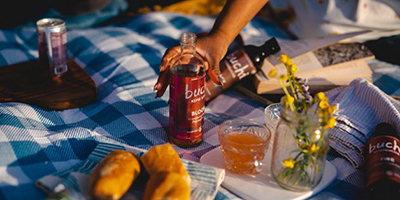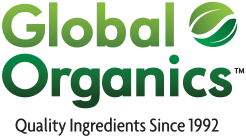Meet the Kombucha Company Tackling Food Scarcity with Regenerative Supply Chains
12.13.2022 | Author: Global Organics | Category: Cane Sugar & Sweeteners, Organic & Sustainability, Company News
inc. Magazine
There's a high bar to clear to work with Buchi, a fermented beverage company that doubles as a benefit corporation.
Sourcing with intention is a core tenet at the fermented beverage maker Buchi, for admirable if obvious reasons.
The 14-year-old Marshall, North Carolina-based company, which sells both kombucha and kefir sodas, uses a regenerative, or sustainable, supply chain that offers to return more resources than the original input. The produce, herbs, and other ingredients that go into Buchi's drinks, which are sold at Whole Foods, Wegmans, and Amazon, among other prominent retailers, are grown with regenerative farming techniques. Specific farming and gardening techniques aim to regenerate the soil, which could include crop rotation, the reduction of tilling, and ditching synthetic fertilizers and pesticides.
Regenerative farming is gaining traction. The Inflation Reduction Act allocates roughly $20 billion to back more environmentally friendly farming techniques via environmental conservation programs. It's something to pay attention to, at the very least, as more companies become mindful of climate change.

Despite the uptick in interest, getting vendors to conform to environmental or social standards may be tricky. Water, tea, and sugar are the primary ingredients for brewing kombucha. But a shorter ingredient list doesn't automatically make it easier to source an ecofriendly supply.
"Sugar is an interesting crop because it is very environmentally intensive, not only with growing but also with the harvesting process," says Buchi co-CEO Zane Adams. "And we have struggled a lot to find ways to grow sugar without doing deep detrimental harm to our food system."
Sugar also happens to be a commodity that is subsidized by the U.S. government, so the raw price for U.S. sugar is often higher compared with other parts of the globe.
The company first sourced conventional sugar near its headquarters in North Carolina, before weighing organic sugar as an alternative. But Buchi soon learned that there aren't any non-genetically modified organic sugar options within the United States.
"While we are not in the business of arguing whether genetically modified foods are safe or not safe, we're just way more interested in what nature has to say first," Adams says.
So Buchi sought out a supplier that not only produces organic sugar, but also one that's approaching the whole idea of sugar, as Adams puts it, "from the ground up." Rather than focusing on crop quality alone, Buchi wanted a supplier that thought about the inputs in the soil, harvests, production, and environmental factors when growing sugarcane. The environmental implications of sugarcane production include soil erosion, industrial waste runoff, and even pollution that's damaging the Great Barrier Reef.
After searching for an organic and regenerative supply partner, Buchi landed on Global Organics and verified the supplier through mutual friends. Global Organics is a partner with Brazil's Native Green Cane Project, which bills itself as the world's largest sustainable agriculture project that is completely carbon neutral.
Buchi's commitment to the environment is seen in its own facilities, such as with its installation of energy recovery ventilation systems that extract heat from hot water running through coils in its production process. The heat produced in the fermentation process is also used to heat the fermentation room. "It begins to really shift your cost factor," says Adams, who says that the company's profitable growth trajectory is just south of $50 million in revenue. Buchi has posted profits since 2016, and over the next three years is targeting year-over-year growth in the realm of 16 to 20 percent.
Cost savings aside, working with specialized vendors tends to be expensive. Buchi is paying a 20 percent premium, on average, to work with its sustainable partners. "We just prioritize our supply partners and share some of the costs with our retail partners," Adams says. "We are seeing that retailers really value quality and consistency over the cheapest cost possible."
The global market for regenerative farming was valuated at $7.74 billion in 2021, according to Polaris Market Research, a New York City-based market research and consulting firm. While regenerative farming is a growing practice, adoption rates still lag: Sustainability analyst Systemiq reports that the uptake rate needs to triple to keep climate change at bay.
Larger food companies, including PepsiCo and McDonald's, plan to increase their regenerative farmland capacity. "I think [regenerative agriculture] has a tremendous but undertapped opportunity to have a major impact on climate change," Jim Andrew, PepsiCo's chief sustainability officer, told NPR.
Quality assurance is also tough to maintain, but no less vital. Buchi audits each potential supplier to examine its values, capabilities, and of course pricing. It gives preference to those who meet its ESG criteria, purchasing about 60 percent of its volume from independent, women- and minority-owned businesses. Research shows that climate change, after all, disproportionately impacts those in historically underserved communities, primarily people of color.
The audit process consists of a survey that is "a comprehensive tool" examining anything from certifications and inputs to how a company gets business done. Adams says the survey is used to score and identify parts of a business that will "perform well or give us an opportunity to share where we see parts of their business that could improve or be in better alignment with all their stakeholders." Adams says Buchi's management team reviews the survey responses.
Buchi pursues this process so it can adhere to its community-centered and value-driven approach, one the company has held onto since setting up shop in 2008. It also explains why Buchi is a benefit corporation, or an entity that operates not only to make a profit but also to further a mission for the public good. Buchi received its benefit corporation certification in January 2020.
"We can't actually do well for each other and our planet if we aren't very curious, careful, and mindful about the inputs that we use to make the product, the process, and how our products get to the store," Adams says.
Written by Melissa Angell, staffwriter at inc.
https://www.inc.com/melissa-an...


